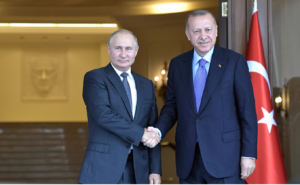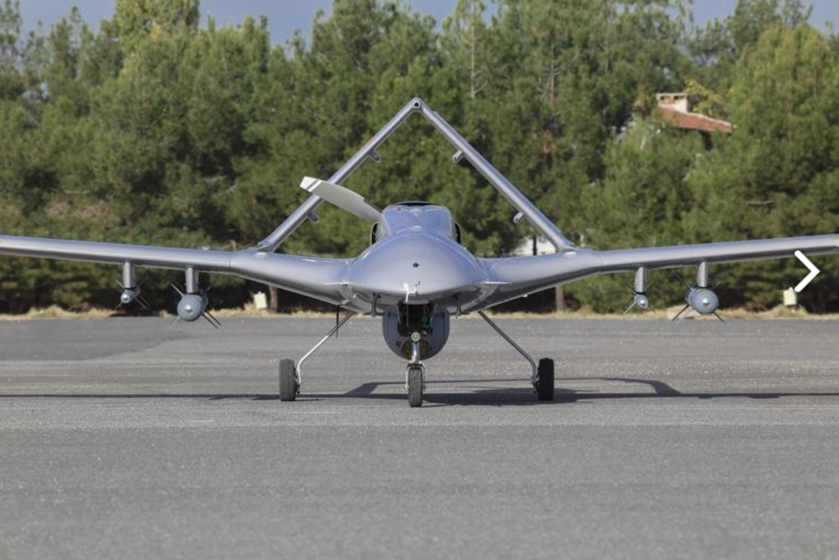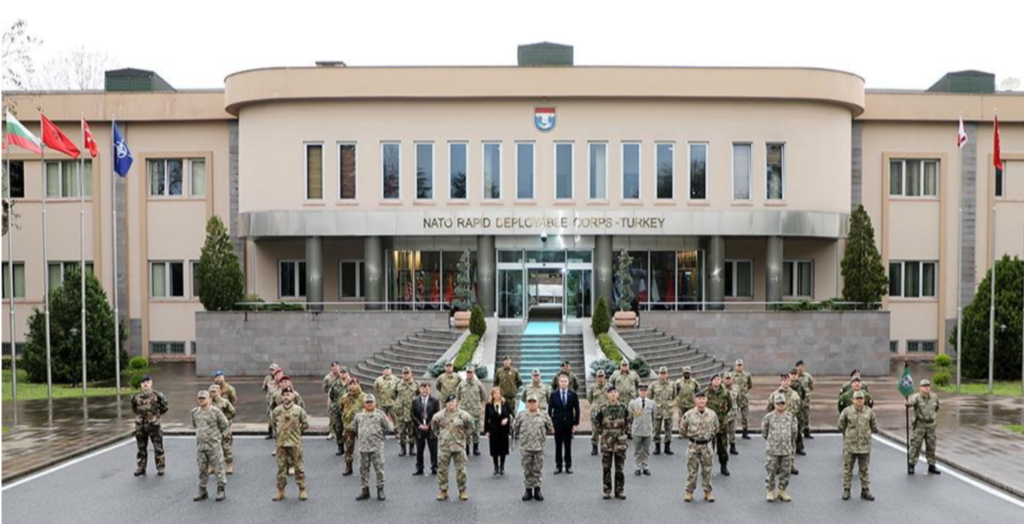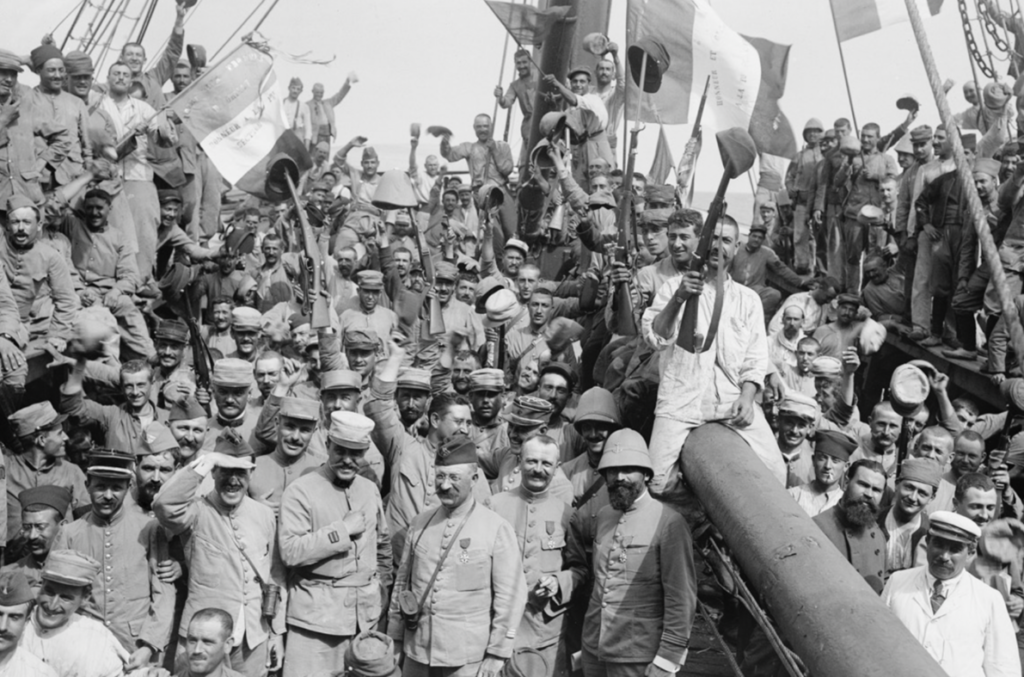Turkish President Recep Tayyip Erdogan © Kremlin.ru
Nestled between the Black Sea and the Mediterranean and at the crossroads of Europe and Asia, Turkey is a country with one of the most complex geopolitical dynamics.
With its activities of hydrocarbons exploration on the Greek coast, which keep causing tensions with the European Union, its interventions against the Kurds in Syria in early 2022, its involvement in the Nagorno-Karabakh conflict or its increasingly violent confrontations with France, Turkey – by virtue of its own rules – is rapidly imposing itself on the international stage.
At its helm, Recep Tayyip Erdogan is pushing his pawns in all directions to create a new sphere of influence around his neo-Ottoman style of leadership and to eclipse the existing fractures at the heart of the Turkish nation.
President Erdogan’s epic journey in politics began in 2001 with the founding of his conservative Justice and Development Party (Adalet ve Kalkınma Partisi) or AKP. The following year, the AK Party came out on top in parliamentary elections, with a political programme centred on the “lost” Muslim identity.
When Recep Tayyip Erdogan became Prime Minister he began to liberalise the economy under the auspices of the International Monetary Fund (IMF), and despite the 2008 hiatus, Turkey experienced an “economic miracle” characterised by a decade of rapid growth.
EARLY SUCCESSES OF THE AKP
Recep Tayyip Erdogan has held power continuously since 2003, when he became prime minister of Turkey, and has also been the country’s president since 2014. This relative longevity is largely due to the effective organisational strength of the ruling AKP party and its ability to adapt to changing circumstances. Broadly speaking, the government programme is based on an ideology that combines nationalism and Islamism.

The success of Recep Tayyip Erdogan and his party, the AKP, is part of Turkey’s particular political ecosystem, where the traditional left-right divide no longer works.
The party’s success is mainly due to the fact that it has managed to update the way it deals with the religious question. Islam, long sidelined by successive governments, has once again become a force for political mobilisation. President Erdogan’s programme, however, is not only about the re-Islamisation of Turkey. The AKP has profoundly renewed the institutional framework, liberalised the Turkish economy and allowed the expression of differences in national identity.
The promotion of Islamic identity has paradoxically revealed Turkey’s social diversity. At first, as if returning to the Ottoman system, the AKP accepted the affirmation of ethnic and religious identities, granted cultural rights to the Kurds and even relaxed the debate on the recognition of the Armenian genocide.
Although the AKP initially claimed not to challenge secular rule, the debate about the place of Islam in the public sphere soon gained momentum. The veiled wives of some ministers disturbed the military and a turbulent debate began about whether the wearing of the same veil should be allowed at colleges and universities in the name of religious freedom and “freedom of dress”.

Many centre-left intellectuals joined the new party, attracted by the emerging social opening and the declared intention to fight against the occult power of the army.
The efficiency of the AKP leadership was initially measured by economic and territorial development. The diplomatic success of the new Turkey was also spectacular.
The charismatic foreign minister Ahmet Davutoglu (between 2009 and 2014), theorist of an Islamist vision of international relations, managed within a few years to turn his country into a hyperactive middle power on the international stage.
Under his aegis, Turkey implemented a kind of “soft power” in which religion was an increasingly explicit element, and opened up spheres of influence in former imperial possessions, especially in the Middle East, with its “neo-Ottoman” foreign policy.
At the time of the Arab Spring in 2011, Turkey was often touted as a “model” of Muslim democracy to navigate the fragile political transitions in Egypt and Tunisia.
Bolstered by steady electoral success, the AKP began to adopt a more overtly conservative identity. The political leadership’s promotion of prayer, Ramadan fasting, social segregation of the sexes, the increase in resources of the powerful Bureau of Religious Affairs
(Diyanet), the construction of mosques, the development of the religious education system, these were all the signs of re-Islamisation that is now being scrutinised both by secular opponents in Turkey itself and by the country’s Western partners.
NEGATIVE IMPACT OF THE AKP
The foreign policy of the AKP remains a constant source of unease within the European Union. Beginning in 2011, the governing party forged alliances with all the Arab political parties with close links to the Muslim Brotherhood. Consequently, the debate still rages over the compatibility of Islamic values with Turkey’s candidacy for membership in the European Union.

Recep Tayyip Erdogan’s authoritarian drift was rapid. A first major episode of protests crystallised in the spring of 2013 around the Gezi Park affair – a green space threatened with destruction by a real estate project in the heart of Istanbul. There was a brutal crackdown on protesters by the security forces.
Then, at the end of the same year, a serious corruption scandal broke out, involving government ministers and even President Erdogan’s son. The latter fell out with Fethullah Gülen, an imam who had taken refuge in the United States and who had been at the head of a vast international network of schools and other educational institutions. He had also provided the AKP with a large number of executives.
The hunt for the opposition took on unprecedented proportions following a failed coup attempt on the night of July 15 to 16, 2016. Faced with a motley coalition of poorly coordinated mutineers, the Head of State called his supporters to take to the streets to “defend democracy”. The death toll reached an estimated 300 people. Recep Tayyip Erdogan described the putsch as a “gift from God” and promptly declared a state of emergency, allowing him to rule by decree. Separation of powers and judicial independence are the cornerstones of democratic societies and such development was always likely to raise more concerns from the EU in an already problem-fraught relationship.

Gülenists, pro-Kurds and liberals were targeted by massive purges which lead to tens of thousands of dismissals and mass arbitrary detentions of thousands of individuals within the army, security services, justice and education. The president immediately passed a constitutional reform to change the parliamentary governance system into an executive presidency which gave the president unprecedented powers including an increased influence over parliament and the courts – two main sources of checks and balances.
The degradation of public freedoms and the re-Islamisation of society made the political climate inexorably tense and elections less respectful of European standards.
The president who can count on a loyal electorate of at least a third of the population continues to win them over.
To consolidate this base, he allied with the extreme right of the MHP party (Milliyetçi Hareket Partisi) before the presidential and legislative elections of June 2018.
Therefore, the pragmatic itinerary of the AKP led it to reconnect with the “Turkish-Islamic synthesis” (Türk-Islam sentezi), a doctrine professed in the early 1970s by certain Turkish nationalists to counter the revolutionary left.
This synthesis placed Sunni Islam and Turkishness at the foundations of Turkish political culture. It also cultivated historical references to the Ottoman Empire. This familiar doctrine allows President Erdogan to reassure the majority of the Turkish electorate while excluding large minorities – Kurds, Alevis, and secular activists – from the political debate.
It also levels the playing field for the Islamist side. While the AKP had for years dealt with Sunni diversity itself, the time had come to take full control.
Focus on shaping the future

Today, President Erdogan may have experienced a slight weakening in his position, but he is returning to nationalism to curb the erosion of voter confidence within his core electorate. The “Turkish-Islamic synthesis” thus merged into a hybrid ideology: the two major driving forces of the Turkish political machine, namely Islamism and nationalism.
In 2014, Turks elected him president in the first round with 51.8% of the vote, notably from a middle class convinced of his ability to turn the economy around. However, since 2013, the Turkish miracle has given way to a slump. A long economic crisis has shaken the country, plunging it into cycles of a recession that seem to follow one another endlessly.
The national currency – the Turkish lira – has been collapsing for several years, resulting in continuous inflation that reached 15.2% in 2019. The Turkish middle class, which emerged in the 1980s and grew stronger in the 2000s, is bearing the brunt of the rising cost of living and is suffering from the consequences daily. Concurrently, inequalities continue to subsist, especially between urban and rural areas.
Faced with this downturn, the government and the central bank are struggling to implement effective monetary policies, despite the need for economic restructuring.
President Erdogan’s economic policy focuses on attracting tourism and foreign capital, especially through real estate projects, such as his urban redevelopment projects in Istanbul. But these major projects envisaged by the Turkish president have so far seemed costlier than lucrative.

Recep Tayyip Erdogan has also been to some extent, destabilised by the Kurdish question. The Kurds, a people scattered along the frontiers between Syria, Iraq, Iran and Turkey, have aspired to an independent state for centuries. But this claim is unacceptable to the Turkish ruler, even though they occupy a key territory for Turkey’s energy resources. The result has been stubborn repression against them, in an attempt to contain their ambitions.
Although voters re-elected President Erdogan in 2018, his success continues to suffer from the country’s economic difficulties and repressive tendencies. In the regional elections of the same year, he lost Istanbul, which concentrates 15 of the country’s 80 million inhabitants, and Ankara, it’s capital of 5 million inhabitants.
Two costly losses for the leader, who was mayor of Istanbul from 1994 to 1998. Faced with this decline in popularity, he seems all the more determined to strengthen his electoral base by playing on identity politics and nationalism. But by so doing, the populist president is using Turkey’s international influence and foreign policy to cover up the country’s internal problems.
AN INTRICATE, INTERNATIONAL WEB
Outside Turkey’s borders, President Erdogan is becoming something of a “hyperactive” politician. He has made his presence strongly felt in Nagorno-Karabakh, Syria, Libya, the Black Sea and the Mediterranean, and he continues to intervene wherever he can in order to make political gains.
As a result, Turkey has managed to establish numerous alliances, both in the East and in the West, with which it seems to share less and less common ground.
The Turkish president appears to be very close to his Russian counterpart Vladimir Putin, even though the two leaders support opposing parties in several conflicts, such as in Syria or more recently in Nagorno-Karabakh. But the two men have always made sure that they can get around these differences and that their good relations prevail.

This strong relationship can be explained in particular by their partnerships in various sectors. Since 2010, Turkey and Russia have established several cooperation agreements, including the construction of a nuclear power plant and a joint gas pipeline. In parallel, they also cooperate on a military level, with important arms sales.
In September 2021, President Erdogan announced that Turkey would maintain its plan to buy a second batch of S-400 missile defence systems from Russia, a decision that could aggravate tensions with the United States even further and lead to new American sanctions. The United States is strongly opposed to the purchase of the S-400 by Turkey, believing in
particular that the Russian systems are not compatible with those in use in the Nato alliance, of which Ankara is a member.
In addition, Washington believes that there is a risk that the Russian operators who will train the Turkish military in the operation of the S-400 could at the same time be able to penetrate the technological secrets of the new American F-35 stealth aircraft which Turkey also wants to acquire. Ankara, for its part, maintains that it has not been able to obtain air defence systems from Nato member states on satisfactory terms.
In an interview aired in September 2021 on CBS News, President Erdogan declared defiantly, “In the future, no one can interfere with the type of defence system we buy, no matter from which country, no matter how big the transaction. Nobody can interfere with that. We are the only ones to make this kind of decision”.

In December 2021 the United States imposed sanctions against the Turkish Defense Industries Board (SSB), its president and three employees after Ankara acquired a first batch of the S-400 anti-missile system. Discussions have continued between Russia and Turkey regarding the delivery of a second batch, which, as Washington has repeatedly warned, would most likely trigger new sanctions.
The United States is now reportedly pushing Turkey to trade those Russian air defences for American Patriots and give the S-400s to Ukraine. However, if Turkey were to comply, it would shoot Russia in the back ; there is very little chance of that happening.
Despite appearances, Russians and Turks are not the best of friends. They find themselves on opposite sides of many wars, including that of Syria. However, they have a “good working relationship” as one would say in diplomatic terms. In fact, when the Turkish regime was threatened by a coup in 2016, Vladimir Putin was the first foreign leader to call his Turkish counterpart. Today, Ankara stubbornly refuses to comply with sanctions against Russia, thus lending itself to circumventing them. There has already been talk of wealthy Russians putting their money in Turkish banks and airlines flying the Turkish flag.
A DANGEROUS BALANCING ACT

Despite Turkey’s defence purchases from Russia that have alarmed Ankara’s Nato partners, the two countries remain rivals in wars from the Middle East to the Caucasus, highlighting the fault lines running through their awkward alliance.
Other than missiles, Turkey imports Russian gas, hosts millions of Russian tourists and has said membership of the Western Nato alliance is no barrier to building ties with Moscow. But it has also deployed troops in northern Syria to push back Russian-backed Syrian government forces, and the two countries backed rival sides in the wars in Libya and Nagorno-Karabakh.
The Russian invasion of Ukraine in February 2022 has created a whole new set of dynamics that has profoundly altered the political equilibrium in the Black Sea region. Turkey fears that Russian advances in Ukraine would ultimately disrupt arms cooperation between Kyiv and Ankara, strengthen Moscow’s dominance in the Black Sea region and threaten tourism and energy supplies.
Ukraine has been like a dam that contains Russian influence and pressure on the region, and if Ukraine falls, it will have direct consequences for Turkey. History teaches us that during the century that followed the fall of the Crimean Khanate, in old European historiography and geography known as Little Tartary, the Russian Empire gradually but resolutely monopolised territories to the west of Ukraine, until it reached the gates of Constantinople, now Istanbul, in 1878.

Under pressure from Moscow, the Ottomans lost the Balkans, while new states were born. Thousands of Turks found themselves refugees. In the east, the Russian Empire seized the Caucasus after a murderous campaign that killed hundreds of Muslims and took Turkish cities such as Kars, Ardahan and Artvin.
It is stories like these that come to mind in Turkey as Russia, slowly but surely, continues its military advance westward, leaving behind a trail of death and destruction. Everyone in Ankara knows that this has put Turkey in the crosshairs of this conflict.
For months, Turkish President Recep Tayyip Erdoğan has been trying to bring his Russian and Ukrainian counterparts together for a peace summit in Turkey, to give diplomacy a chance. But Turkish officials are well aware that Russian President Vladimir Putin does not want this meeting : his spokesman, Dmitry Peskov, even mocked this initiative.
But talks between the Ukrainian and Russian foreign ministers did take place in March 2022 on the sidelines of an international diplomatic forum in the southern city of Antalya.
Turkey thus became a de facto mediator in this European conflict. It was encouraging to see the two belligerents discuss and use diplomatic channels to try to resolve this conflict. Nevertheless, the loss of the diplomatic influence of France and EU countries was also to be regretted.
Due to its geographical position, Turkey plays a pivotal role in the region which is not ignored by either the Russians or the Americans. Therefore, Ankara plays a double game, aiming to have the support of both camps in order to develop its own project of becoming a regional power in the Near and Middle East.
Because of its increasingly authoritarian political nature and its position as a regional power, Turkey needs NATO as much as it needs Russia, in order to avoid being politically dependent on one or the other. But at the same time, Presidents Erdogan and Putin speak the same language; that of two authoritarian leaders at the head of ancient empires straddling Europe and Asia. They both want to restore their country’s influence in their “near vicinity”.
The case of Turkey shows that it is possible to be a member of Nato and to have strong relations with countries at war like Ukraine and Russia. In fact, France has long occupied this position of mediator. The Gaullist doctrine that has long prevailed at the level of foreign affairs has pushed the country towards a nuanced policy. Neither Atlanticist nor pro-Russian, but seeking to be a bridge between the various powers in order to defend French interests. And today, many, not least the French, may regret that an authoritarian regime has taken the place of France and the so-called liberal democracies in the field of high-level mediation.
Be that as it may, and at the risk of irritating Vladimir Putin even further, the Turkish president travelled to Kyiv and met his counterpart, Volodymyr Zelensky.

The Ukrainian leader welcomed an agreement that will allow Ukrainian factories to produce Turkish drones already deployed by government forces against pro-Russian separatists in eastern Ukraine.
Russian authorities, including Foreign Minister Sergey Lavrov, have repeatedly made it clear that Moscow is very unhappy at Turkey’s sale of TB-2s to Ukraine, which uses them to hit Russian positions throughout the Donbas.
TURKEY’S DOUBLE-EDGED SWORD
According to Turkish officials, Ankara’s growing international influence has already created tensions between Turkey and Russia. Turkey undermined Russian air defence systems in Libya, Syria and Azerbaijan, but things stopped there and they continue to live together in the region.
Ankara created some friction within Nato by buying the Russian S-400 missile system in 2020, but it also it authorised that same year the American army to inspect another Russian defence system seized by the Turks in Libya.
Moreover, Turkish officials fear that if Russia continues its invasion of Ukraine, it will strengthen its dominance in the Black Sea and put significant pressure on other countries, such as Romania and Bulgaria. Others even believe the supply of Turkish drones to Ukraine could have repercussions for Ankara in Syria, where Turkish troops are hampering a joint Syrian government and Russian offensive on Idlib that could push millions of refugees across the border.
Galip Dalay, Associate Research Fellow at the French Institute of International Relations (Ifri) says, “Syria remains Turkey’s weak point. On this, Russia will probably put pressure on Turkey via Syria. On a broader level, Russia and Turkey cooperate and compete with each other through the conflicts in the Middle East and North Africa. However, Moscow is less open to replicating this experience with Turkey in the former Soviet Union“.

According to Dalay, Moscow sees the conflicts in the Middle East and North Africa as opportunities for coups and a chance to project its influence. It is much less flexible and accommodating towards Turkish policy towards the former Soviet Union states, which it still considers its exclusive sphere of influence.
Since the start of Russia’s invasion of Ukraine, Ankara has tried to maintain a certain balance in its relations with Kyiv and Moscow. If he never fails to proclaim “Turkey’s support for the territorial integrity of Ukraine”, as indicated by the Turkish Anadolu press agency, Recep Tayyip Erdogan has been careful not to join in the Western sanctions against Russian interests and has also abstained in the Council of Europe during the vote suspending Russia.
With full sovereignty over the Bosphorus and the Dardanelles Straits, which connect the Black Sea and the Mediterranean Sea, Turkey reaffirmed its position by refusing access to these strategic points to three Russian military ships on February 27 and 28. Of course, this had no major impact on the strategic course of operations, because the war in Ukraine is above all being fought on land, but Turkey wanted to prevent it from deepening and to avoid any maritime spillover from this conflict.
Nearly six months after the start of the Russian invasion, this skilful balancing act has enabled Turkey not to maintain friendly relations with both Kyiv and Moscow, and to be able to welcome Russian and Ukrainian delegations to Istanbul for a number of discussion sessions.
But is this position tenable over time? The big question is whether the country will be able to continue this policy of doing the splits in an increasingly polarised world.
A number of political analysts are of the opinion that Recep Tayyip Erdogan sees the war as an opportunity – « a boon », says Pinar Tremblay, scholar of political science at California State University. The opportunity to win the presidential elections next June. Despite all the legal tricks he has already used to bend democracy to his advantage, the Turkish president’s position is now more shaky than ever.

Indeed, six opposition parties, including the largest, have joined forces, his popularity is at an all-time low and his AK party is between 25 and 35% in the polls, while in 2018 he still won 43% of the votes. Finally, the Turkish economy is in dire straits, with inflation reaching 54% in February, its highest level in 20 years. This economic situation is aggravated by the current war. If only because Turkish tourism is heavily dependent on visitors from Russia.
Recep Tayyip Erdogan can capitalise on the fear of even greater conflict, which is also prevalent in Turkey. In times of crisis, voters tend to opt for the safest choice, for the familiar and for a strong leader as well.
Also, Turkey probably has no moral objections to the war that Russia is currently waging, because it has faced a rather similar situation for years. The biggest difference between the conflict with the Kurds is that the front line runs through Turkish territory. Turkey is of course also implicated for its role in the war in Syria.
So why is Turkey so keen to mediate? Wagging tongues would have it that this role gives the country an alibi for not having to take sides. However, it seems to be doing the Ukrainians a great service by supplying them with the dreaded Bayraktar drones, but the contracts for these were signed before the war started. This is fundamentally different compared to the arms deliveries that many other countries have decided to make since the beginning of the war.

TACKLING THE WORLD FOOD EMERGENCY
Following telephone conversations between President Erdogan and his Russian and Ukrainian counterparts, military delegations from the two countries at war arrived in Istanbul on July 13 for a summit that was also be attended by Turkish defence officials and UN envoys. The aim of the meeting was to find an agreement on a corridor that will allow the exit of Ukrainian wheat blocked due to the war, from the Black Sea ports.
At the centre of the talks were the 35 or so million tonnes of Ukrainian wheat stuck in Black Sea ports due to the war, which is in danger of rotting and creating a global food crisis.
Turkey has proposed the establishment of a logistics control center in Istanbul, with the participation of the United Nations, in order to trace the route of ships leaving the Black Sea by a route free of the mines which now infest the waters, especially near ports.
President Erdogan’s diplomatic pressure produced its first effect, culminating in the organisation of this meeting between delegations which was a kind of follow-up to the trip made in June to Moscow by a military delegation from Ankara.
At the end of the meeting, the delegations reached an agreement on a cleared route, which was then taken by a Turkish ship stranded in Mariupol with a cargo of steel, whose return to Turkey constituted a kind of test for the passage of wheat cargoes.
However, there was no final agreement between the parties. This was mainly due to Moscow’s reluctance ; it had laid down a series of conditions before giving the green light to plans to “liberate” wheat. Kyiv also had doubts related to mine clearance and fear of Russian attacks.

Ankara promptly came up with another proposal : the transportation of the wheat by road and rail out of Ukraine before shipping. A definitive solution is still in the works.
Since the start of the conflict, the Turkish and Russian leaders have spoken several times by telephone, but have never met face to face. The hope is that such a meeting would be the right opportunity to unlock 70% of the export grain produced by Ukraine, one of the world’s leading wheat producers and to prevent a global famine of major proportions, especially in Africa.
For the EU’s High Representative for Foreign Affairs, Josep Borrell, “This may be the most important thing that the international community is facing. The most worrisome thing is the lack of food in many countries around the world.”
The 27-country bloc and its Western partners have accused Moscow of weaponising food and of deliberately targeting Ukraine’s agricultural infrastructure.
Borrell, who spoke to reporters ahead of a meeting of EU foreign affairs ministers in Brussels, said the bloc is “doing whatever we can in order to support these grains through other ways, through the solidarity lanes, through the Black Sea to Romania, Bulgaria. But that’s not enough. Russia must unblock and allow the Ukrainian grain to be exported. Otherwise, we would have to continue claiming that they are using food as a weapon without any kind of consideration for human beings’ lives. It has to be said loudly,” he added.
SETTING THE STAGE IN TEHRAN

In Tehran on July 19, President Recep Tayyip Erdogan met with his Russian counterpart, Vladimir Putin on the sidelines of a tripartite summit with Iranian head of state Ebrahim Raisi. Among the key issues of the meeting, the war in Syria as well as Russian-Iranian cooperation in the gas and oil sectors with both countries under Western sanctions.
Turkey’s role as mediator in the Ukrainian grain export crisis was also emphasised when the Russian president spoke of progress in the negotiations for the export of grain from Ukraine via the Black Sea and thanked his Turkish counterpart for his “mediation” in this issue.
But he also called for the lifting of Western restrictions on Russian cereals so as to achieve progress in the export of Ukrainian agricultural production blocked in the country’s ports because of the Kremlin offensive. “We will facilitate the export of Ukrainian grain, but on the basis that all restrictions on air deliveries for the export of Russian grain are lifted,” Vladimir Putin said after talks in Tehran. “If they sincerely want to improve the situation in world food markets, I hope the same will be true for Russian grain exports,” he added.
It became apparent later that the Turkish leader made Vladimir Putin wait in front of the cameras for forty-five seconds. A gesture that speaks volumes and with which the Russian president is quite familiar. In politics, other than words, gestures also have meaning.

And when you are the president of one of the great world powers, forty-five seconds of forced waiting is a long time. Vladimir Putin knows this well and he struggled to hide his discomfort in front of the cameras. The Russian president remained standing in front of his armchair and the Russian flag, his hands crossed in front of him. With his irritation mounting as the seconds passed, he began shifting his weight from one foot to the other, and then making faces.
This is a practice to which Vladimir Putin himself has often resorted in the past. During a meeting in Moscow in 2020, the Russian president, no longer in a position of strength vis a vis Recep Tayyip Erdogan, had made him wait several minutes.
Among other heads of state who experienced this ordeal, there is Queen Elisabeth II who was made to wait for 13 minutes, Donald Trump for 45 minutes and Pope Francis for one hour. But that fact that he is now the victim goes to show that he is no longer in a dominant position.
But the Russian president left Tehran with the visible support of the Iranian leaders, showing that he is not totally isolated on the international scene. But Iran is also a country under Western sanctions. And by making him wait, Recep Tayyip Erdogan probably made him understand that the support of a country integrated into the concert of Nations comes at a cost.
TURKEY’S DREAM OF GRANDEUR

What matters for Recep Tayyip Erdogan, other than victory in the elections, is not finding himself on the losing side at the end of the conflict.
“It is the outcome of the war that will determine which side Turkey leans on,” writes Jeffrey Mankoff, a researcher at the US National Defense University, in Foreign Policy magazine.
“If Russia loses, Ankara is likely to align itself with the West again. But if Russia wins, it may turn even further away from Nato and the EU”, according to analyst Selim Koru, himself from Turkey, and research fellow at the Economic Policy Research Foundation of Turkey (TEPAV), an Ankara-based think tank. If Nato fails to curb Moscow’s territorial claims based on national, ethnic and historical bases, then Ankara’s beliefs about the diminishing relevance of Nato will be confirmed and this could fuel Turkey’s hopes for a new era in geopolitics.
These days, Ankara does not necessarily view the Russian resurgence as a threat.
Indeed, President Erdogan’s worldview, as well as that of the Turkish right as a whole, is much closer to that of Vladimir Putin than to that of Western liberal elites.
This may seem unimportant to policy makers, but it is the emotional backdrop of the entire political apparatus, which shapes popular perceptions and strategic culture. President Putin famously declared in 2005 that “the demise of the Soviet Union was the greatest geopolitical catastrophe of the 20th century”. His major foreign policy exploits, from the 2008 Georgia war to the current Ukraine crisis seem to be aimed at reversing that ‘catastrophe’.
Many Turks can probably relate to this aspiration. For conservatives like Recep Tayyip Erdogan, Turkey’s status as a junior partner in a US-led transatlantic alliance and a medium-sized power is probably not a particularly enviable one.
The Turkish right dreams of a revitalised Turkish sphere of influence, projecting its power across three continents. The AKP, having headed the national government for twenty years has enabled it to breathe life into the country with this vision.
Turkey’s founding fathers defeated Western forces at the Battle of Gallipoli in 1915 to build a republic that held up Western modernity as a model. The current government, whose roots go back to the radical right-wing dissidents of this tradition, seeks to do the opposite. It sees the West as an anti-model: a rival to be emulated at first, but ultimately, beaten at its own game.


The relationship of the Western world, with its strong Judeo-Christian influences, to the Muslim religion is a sensitive one and President Erdogan sees this as a golden political opportunity to play with his influence internationally.
Initially, he endeavoured to send a number of seconded imams, particularly to European nations as a direct way of spreading Turkey’s religious influence beyond its borders, and particularly within countries with large Muslim minorities. He also uses religion to consolidate his influence in the East, where Islam and politics are closely intertwined in many countries.
His credo seems to be to embody a religious alternative to the “neocolonial and heretical” West. A credo that resonates well and truly in the Near and Middle East as was demonstrated by the boycott of French products in the region, actively supported by Recep Tayyip Erdogan.
Indeed, France drew the wrath of much of the Muslim world for President Macron’s scathing remarks against Islam, which he described as a “religion in crisis”. He had made these remarks during a speech on the separation of religion and state as well as the defence of the freedom to blaspheme, in reference to the controversial caricatures of the Prophet Mohammed, published by the satirical newspaper Charlie Hebdo.

President Erdogan seized on the opportunity, going so far as to question the mental health of the French president. The Turkish leader, through the virulence of his remarks, transposed his populist discourse on a transnational scale, in a desire to unite the Muslim world around Turkey and its programme regarding the identity crisis.
Between now and the next elections in 2023, President Erdogan has time to continue to nurture his project of a ‘Greater Turkey’. What’s more, he has obtained a constitutional derogation that allows him to offer himself – provided he has democratic approval – another two new, five-year terms as president, when in fact, he should not have been able to stand for re-election.
Although his global popularity rating is down, he nurtures his grass roots support by resorting to his international influence. He is therefore well on the way to proposing a structured approach to the fracture of our century: that of the identity crises that create the tensions between civilisations, in a world where peoples are nevertheless, ever more connected and interdependent.
If the Turkish president succeeds in pulling this off and manages to tame these dissensions, he will have in his hands a powerful political tool, but whose control he could also quickly lose.

